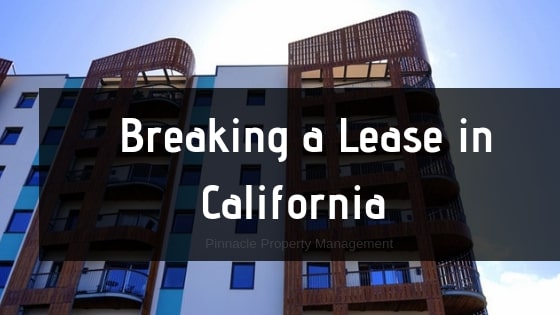
In California, as in many states, leases are legally binding contracts. Once a tenant signs one, they must stay for the entire lease term, which is usually one year. But, what is a tenant to do if they are unable to pay your rent? Or, when they need to move closer to their new job? Do you find a new tenant?
In such instances, despite a tenant's best intentions to stay for the full lease term, they may need to break the lease early.
In this article, we will overview how to break a lease in California.
Breaking a Lease in California
Simply put, this means leaving before the expiry of a fixed-term lease and leaving you to find a new tenant.
Breaking a lease before the term ends carries a number of consequences. They include:
- Difficulty renting a new place. Most landlords ask for rental references or review prospective tenants’ credit reports. With information like an eviction, poor rent payment habits, or breach of contract on your report, getting a new place to rent might prove challenging.
- A judge can issue a judgment against a tenant. A credit judgment is an order to cover a debt, and after hearing the case, he or she might issue one against you.
- You may face a civil lawsuit. Sure, a divorce, an illness, or a job loss can negatively impact your ability to pay rent. But sadly, in the state, this isn't a legal justification for a tenant to break a lease before it ends. In most cases, your landlord will win the lawsuit and a judge will order you to pay off the lease balance.
Tenants' Rights and Duties When Signing a Lease
Usually spanning one year, a California lease or rental agreement is a contract between a California landlord and their tenant outlining the rights and responsibilities of each party. California law requires landlords to adhere to these laws.
Under a typical lease, unless the lease itself allows it, a landlord cannot raise the rent or alter other terms. Also, the landlord cannot force you to vacate the property before the lease expires. The only exception is if you breach the terms of the lease. For example, if, for whatever reason, you are unable to continue paying rent, you may want to break a lease. Or, you breach another significant lease term, such as disturbing the peace of the neighborhood by hosting raucous parties.
But even supposing these breaches to the California lease agreement do occur, the California landlord-tenant law requires landlords to adhere to the lease laws when ending the tenancy. For unpaid rent, your California landlord must give you a 3-days “pay or quit” written notice. Essentially, the notice gives you two options: either to pay the unpaid rent or simply move out of the premises. If you fail to do any of these things, the landlord can file for an eviction lawsuit against you in court.

For illegal activities within the unit, California’s rental law requires your landlord to hand you a 3-days’ unconditional quit notice. Unlike the previous written notice, this gives you only one option – to leave.
Once you sign a lease, you are lawfully bound to pay rent for the entire term of the rental lease. Here is an example to better illustrate this. Suppose your monthly rent is $1,500 and the lease runs for twelve months, this means you owe a total of $12,000 for the entire lease period.
Now if you break your lease, say, on the ninth month, you’ll end up still owing your landlord $4,500 worth of rent.
However, this is not always the case. Not all tenants who break their lease have to pay the remainder of the rent due under the lease agreement. It depends on whether there is a legal justification for breaking the lease or not.
When Breaking Your California Lease Agreement is Legally Justified
1. Your landlord agrees to it
This is the most ideal way to legally break your lease early without facing any consequences. Some landlords may prefer this route as opposed to taking their tenants to court and will simple find a new tenant. The court process can be expensive, time-consuming, and utterly frustrating for any landlord.
There also may be an early termination clause you can use.
2. You are a victim of abuse or domestic violence
Under California law, if you are the victim of some form of abuse – be it elder abuse, sexual abuse, domestic violence, and so forth – early lease termination can happen so long as specific conditions are met. You will not be liable for further rent obligation for the next rent period and might want to file a temporary restraining order.
3. The unit is not considered legal
For a rental unit to pass building codes and be considered a legal unit, it must meet specific criteria for prospective landlords to rent it out.
For instance, attached rooms, garages and other types of units that were previously used for another purpose but have been converted to rental units may be deemed illegal if they don’t meet code.
Likewise, there are many basement apartments that don’t incorporate specific traits and are therefore aren't deemed legal units. Doesn’t matter if there may already be California tenants living in them.
So, if a unit isn't considered legal or a landlord fails to make it safe, early termination of the lease in California is allowed.
4. Your unit is deemed unsafe as per the rental law
Under California rental law, a rental unit must be considered safe for habitation. If not, you have the right to break the lease on the basis that your landlord is providing an uninhabitable unit.
Examples of things that can cause a rental property to be considered uninhabitable include:
- A high level of criminal activity in the building;
- Obnoxious noise from neighbors
- Pest infestation
- Nauseating smells
In any of these situations, you can break your lease early and get your security deposit.
5. There is landlord harassment
As per California landlord-tenant law, your landlord cannot just barge in on you whenever they feel like it. As a renter, you have a right to the quiet enjoyment of your unit. Before entering the rental, your landlord must give you adequate notice of entry.
Similarly, your landlord cannot harass you or be found guilty of having constructively evicted a tenant. For instance, by changing locks on you or shutting off your electricity. If they do, tenants can break their lease in California. The Fair Housing Act also protects against discrimination of any kind.

6. You are starting active military duty
Federal law permits early termination of a lease if you enter active military service. You must belong to the “uniformed services.” That includes those serving in the:
- Activated National Guard
- Commissioned Corps of the Public Health Service
- Commissioned Corps of the National Oceanic and Atmospheric Administration
- Armed forces
Once you get the change of station orders or military deployment, you’ll then need to notify your landlord of the same. Your tenancy will then terminate thirty days after the rent is due next.
Bottom Line: Breaking a Lease Early
Both landlords and tenants have mutual responsibilities under the lease. If you must break a lease before the term ends, understand California’s rental laws first. Hopefully, this article about breaking lease agreements has helped you in this regard.
If you have more questions about breaking your lease early or any other California law, contact our management company today.
Disclaimer: This information about breaking a lease early is only meant to educate and not serve as legal advice. For further help or more information, please consult an experienced management company or attorney.







